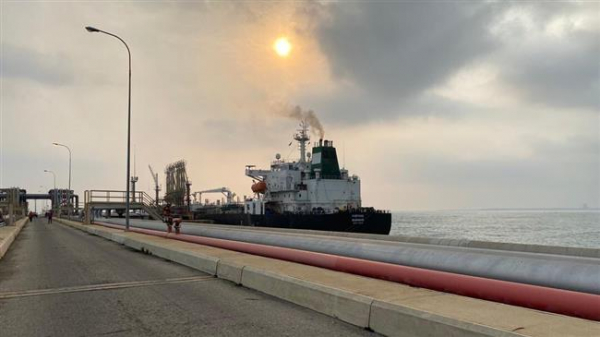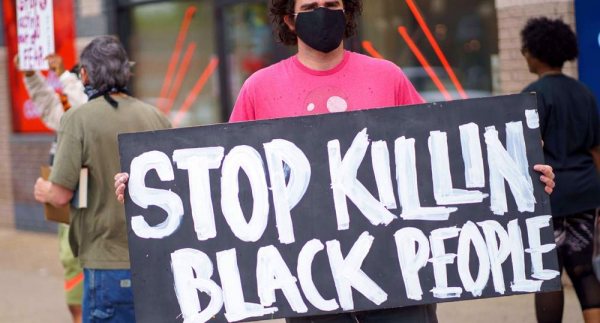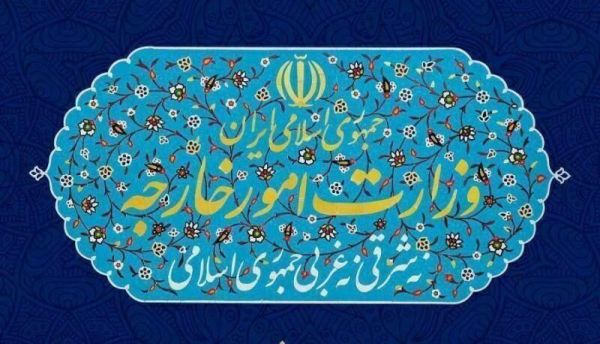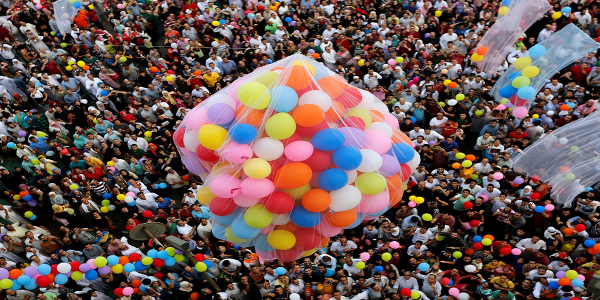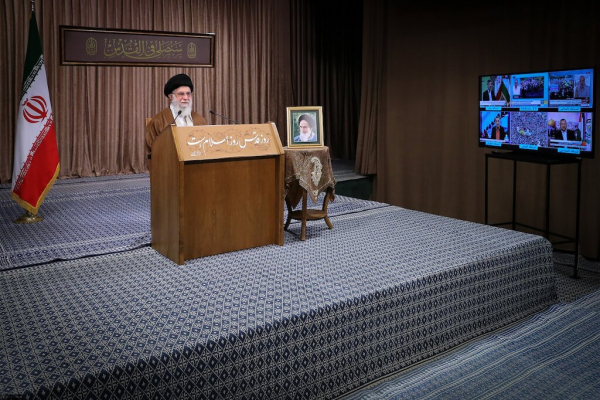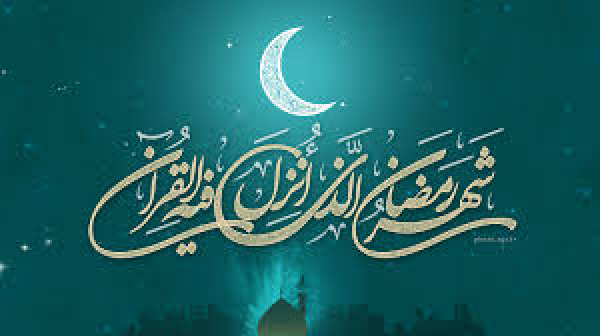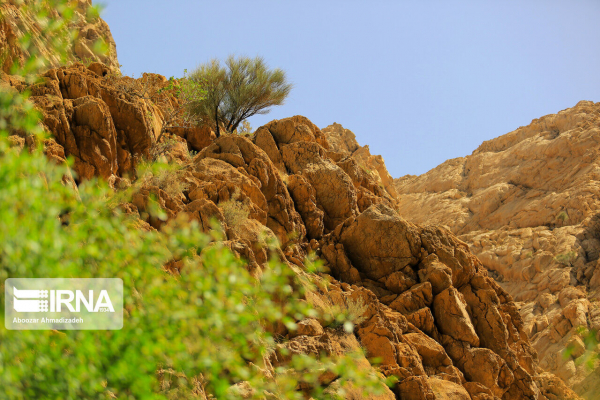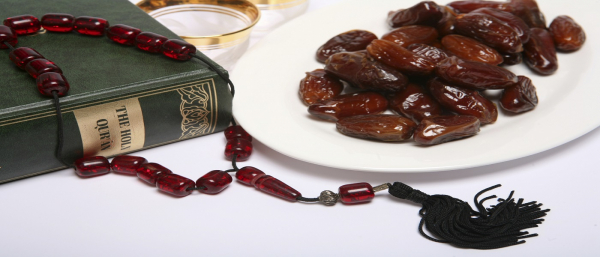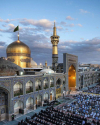hasania
‘Gracias Iran’ Venezuela’s top Twitter trend as Iran tankers deliver much-needed gasoline
The hashtag #GraciasIran (Thank You Iran) has become the number-one Twitter trend in Venezuela as Iranian tankers start delivering much-needed gasoline to the Latin American country facing a fuel crisis.
Upon the arrival of the first Iranian tanker, Venezuelans stormed Twitter to express gratitude towards Tehran for the shipments.
The Venezuelan authorities are also celebrating that the Iranian tankers loaded with gasoline and alkylate are one-by-one docking at the gasoline-starved country.
Venezuelan Oil Minister Tareck El Aissami thanked Iran on Monday for sending fuel, additives, and spare parts to increase fuel distribution and boost refinery output in his country, after the first in a flotilla of five Iranian fuel tankers docked at a Venezuelan port.
“We are fortunate to be able to count on Iran in these times,” El Aissami said from the port at the El Palito refinery in central Venezuela, where the Fortune tanker arrived overnight.
The tanker, Fortune, loaded with 43 million liters of gasoline, arrived at the refinery of El Palito, west of the Venezuelan capital, Caracas.
The second Iranian tanker, Forest, has also sailed into the South American country’s exclusive economic zone.
Venezuela's Telesur television network said on Monday that the Iranian vessel, Forest, had entered the territorial waters of the Latin American country, and just like Fortune — the first Iranian tanker — was escorted by the Venezuelan Navy to its destination.
“Iranian ship Forest approaches Venezuelan coasts. Military forces of that country affirm that in the next few hours she will cross the north of the island of Margarita to continue heading to the El Palito refinery,” Telesur said in a post on its Twitter account.
The other three vessels are also on their way through the Atlantic Ocean to deliver fuel to the country under US sanctions.
The shipments have stirred the wrath of the US administration in Washington as both Iran and Venezuela are under illegal sanctions imposed by the White House.
The administration of President Donald Trump, which has returned US sanctions against Iran after leaving a historic nuclear accord between the Islamic Republic and world powers, said earlier this month that it was considering “measures” to take in response to the shipments.
US police kill blacks with brutality matching Israeli military’s
By Robert Inlakesh
Disturbing footage of a black man being choked to death by a Minneapolis police officer in the United States has sparked online outrage and street protests over what is being described as the lynching of an unarmed black man by armed police. The reaction to this now opens up a wider conversation about why these incidents happen and how the follow-up to the crime is so similar to when Palestinians are killed by Israeli troops.
At around 8.PM, Monday morning, Minneapolis police officers were called to a Cup Foods’ store on the 3700 block of Chicago Avenue South. The suspect was a black man, named George Floyd, who was allegedly attempting to use forged documents. Police spokesperson John Elders claimed that George Floyd had resisted arrest and then went on to say, “Officers were able to get the suspect into handcuffs and officers noticed that the man was going into medical distress.”
However, the alleged “medical distress,” which the police were having the public believe and caused the death of George Floyd, was caught on camera. The video footage shot by a bystander and released onto Facebook this Tuesday, shows 10 minutes, in which the alleged “criminal” was indeed the victim of police brutality. The video shows an officer, allegedly identified as Derek Chauvin (badge number: #1087), pressing his knee into the victim’s neck for at least seven minutes as the victim screamed, “I cannot breathe” and “my neck hurts,” whilst pleading for his life. Bystanders also scream at the three officers present, which intensifies as the victim passes out unconscious, at which point the officer's knee is still planted firmly into the victim's neck.
The officers present have now been placed on paid leave and the FBI has been called to deal with the situation, which many pundits have pointed out may have to do with the reaction to this case.
The reaction to such a murder
This is far from the first incident of its kind in the United States, where white police officers have choked to death unarmed black men begging for their lives, with the most infamous case being the killing of Eric Garner, which did not result in the conviction of any officer.
So, what routinely happens when a case like this appears, especially such a clear cut case. First of all, we see the police statements assuming no responsibility for the death, which occurred in their custody. We see armies of social media warriors coming out to defend the officers and claim that the black man killed was a criminal and ultimately the media follows suit by reporting on all the previous allegations against the victim.
The reactions from the public on the opposite side of the argument are usually to condemn and demand justice, usually resulting in protests and even riots.
However, the arguments coming from the African American community are rarely ever aired and real discussions about what enables a police officer to use such violence is also not discussed even nearly enough.
As usual as with other places in the world where oppressed communities are attacked, like in occupied Palestine, we see a similar campaign of victim blaming online by the privileged community (the Israelis and their supporters). It does not matter how horrendous the crime, nor whether the videos posted online show the entire incident, Israelis will jump to conclusions and will claim that all the information has not yet surfaced and claim that the Palestinian victim was some sort of terrorist or criminal.
We also see that the Israeli military and police -- if the murder is committed in Jerusalem al-Quds or elsewhere inside the Israeli-occupied territory -- will instantly claim that its troops had been under instant threat and that the death of the Palestinian was some sort of dramatic accident. It does not matter how many thousands of Palestinians are killed by the Israeli occupation forces, every time the privileged Israeli community will largely jump to defend the killing and even laugh at it. This is especially the case as in Israel, the regime behind the occupation forces and illegal settlers, who kill Palestinians, consistently propagate ethnic supremacy and ultra-nationalism.
The fact of the matter is that being able to kill someone with such ease and be fine with lying and justifying your actions, speaks to the lack of humanity in the murder. That lack of humanity may come from many sources, whether it be the psychology of some fake superiority complex of those in uniform or whether it be both societal and systematic hatred perpetuated against those policed. In order to kill so easily and so brutally, first you must find a justification; whether that be through dehumanizing the victim or carrying around hatred which enables the rage to commit such an act.
When people speak of racist police murders in the United States, to pass this by and claim that race does not play as a factor, is utter lunacy. The way black people are viewed in the United States, presented in mainstream media, and the poor socio-economic conditions under which large portions of the African American community suffer are not to be ignored. There is also on top of this, the racism prevalent inside the police, the lack of transparency from the police, the history of racism against African Americans, and the deep-rooted stereotypes about black people in the US and throughout the Western world. This is of course only emboldened by the likes of Donald Trump, sitting in the White House, who consistently uses language that can often be interpreted in two ways -- that many US voters do see as racist and do identify with.
This sort of racism is on a larger (percentage wise) and more obvious scale, prevalent inside of Israeli society and promoted by the Israeli regime, against the indigenous population of Palestine. Where daily shootings of Palestinians is justified in the eyes of Israelis over “security” concerns for the Israeli forces, with the assumption that the Palestinian must have been involved in a crime -- a racist notion -- and that, therefore, the murder or severe injury of the victim is somehow justified.
Just as a black man was choked to death yesterday, by what could be described as thugs in uniforms, three Palestinians were also shot this Monday by Israeli forces. If you are to look online at the responses to these two cases, you will see the same thing with both. On one side there are those outraged and then there are those working to justify the act by any means necessary, even if that means ignoring the video and eye-witness testimony evidence.
(Robert Inlakesh is a journalist, writer and political analyst, who has lived in and reported from the occupied Palestinian West Bank. He has written for publications such as Mint Press, Mondoweiss, MEMO, and various other outlets. He specializes in analysis of the Middle East, in particular Palestine-Israel. He also works for Press TV as a European correspondent).
Tanker Trackers focuses on Iranian oil tankers to Venezuela
“We have a lot of journalists getting in touch with us via email, DM and phone regarding this Iran-Venezuela gasoline saga,” Tanker Trackers wrote on its Twitter account.
“All of our updates are posted regularly via our Premium Live Blog,” it added.
Thanks to the attention of the international media to the movement of Iranian oil tankers to Venezuela, the Tanker Tracking Center has identified separate tracking links for each of the five Iranian oil tankers.
Venezuelan President Nicolás Maduro in a message on Tuesday termed shipment of Iranian fuel to Venezuela as sign of Tehran-Caracas solidarity.
In times where the government of oppression seeks to impose its ruling by force, only the brotherly freedom-seekers will save us, he added.
The first Iranian oil tanker named "Fortune" docked at Venezuela's El Palito port on Monday.
The Iranian oil tanker had loaded 43 million liters of gasoline from southern Iranian port of Shahid Rajaei in mid-March.
This is the first out of five Iranian oil tankers that has docked at the northern Venezuelan beach despite the US warnings and sanctions.
The second Iranian tanker named "Forest" has already arrived in Caribbean Sea.
Three other Iranian oil tankers are "Faxon", "Petunia" and "Clavel" that are passing Atlantic Ocean to reach Venezuela.
Iran: It is time to stand up against US violence, warmongering
“Regretful that 100k United States soldiers killed in battles waged because of the US leaders' instrumental rationality & insatiable greed,” Iranian Foreign Ministry wrote on its official Twitter account on Tuesday.
“The US war machines have just led to killing, destruction, atrocities,” it added.
“Time to stand agnst US violence, warmongering, as remembering millions of lost lives, Foreign Ministry noted.
Earlier, Iranian President Hassan Rouhani urged the US to set aside warmongering policies and maximum pressure.
Referring to the fact that today Iran has a peace-seeking and balanced image in the world, President Rouhani said Iran has never been initiator of aggression and sanctions and has not violated the commitments first.
Eid al-Fitr:When Muslims Give Thanks to Allah
“O ALLAH, bless Muhammad (PBUH) and his Progeny ! Bless us in this day of our festival and our fast-breaking, make it one of the best of days that have passed over us.” Imam Sajjad (AS) - Sahifa Al-Sajjadiyya
Eid al-Fitr is the most important festival in the Islamic calendar. It provides us with an opportunity to offer thanks to Allah for having given us the will and strength to observe fast during the holy month of Ramadan. This Eid falls on the first day of the Islamic month of Shawwal and marks the end of Ramadan.
On the day of the celebration, a typical Muslim family gets up very early to perform the following tasks:

1. Reciting Takbirs
It is recommended to recite the following Takbirs after performing the Dawn prayer (Salat al-Fajr):
"اللَّهُ أَكْبَرُاللَّهُ أَكْبَرُلاإِلَهَ إِلااللَّهُ وَاللَّهُ أَكْبَرُاللَّهُ أَكْبَرُوَلِلَّهِ الْحَمْدُالْحَمْدُلِلَّهِ عَلَى مَاهَدَانَاوَلَهُ الشُّكْرُعَلَى مَا أَوْلانَا"
‘AllaahuakbarAllaahuakbar la ilaahaillallaahuwwllaahuakbarallaahuakbarwalillaahilh’amd al ha’mdulillaaha’laamaahadaanaawalahushukrua’laamaaawlaanaa’
It means: “Allah is Great. Allah is Great. There is no god but Allah. And Allah is Great. Allah is Great. (All) praise be to Allah. (We) sing the praises of Allah because He has shown us the Right Path. (We) gratefully thank Him because He takes care of us and looks after our interests.”
2. Giving Zakat al-Fitr (Fitrah)
Zakat al-Fitr is a mandatory religious tax paid by those who can afford it as a kind of charity at the sunset of Eid alFitr night (i.e. the night preceding Eid day), which is about three kilos of the item commonly eaten per person in the house (e.g. wheat, barley, dates, raisins, rice or millet, etc.).
You can also pay the price of one of these items in cash. Fitrah should be given to deserving believers whose income is not sufficient to spend on their families for one year. It is better to give it before the Eid prayer (Salat al-Eid).
3. Performing Eid prayer
The Eid prayer is performed in the morning, between sunrise and the Midday prayer (Salat al-Zuhr). It can be performed either individually or in a congregation and consists of two Rak’ahs (units). During the first Rak’ah, you should recite the first chapter of the Holy Quran (Surah al-Fateha).
Thereafter, you can recite another chapter of your choice. However, it is recommended to recite Chapter 91 (Surah al-Shams) in the first Rak’ah and Chapter 8 (Surah al-Ghashiya) in the second one following Surah al-Fateha; or alternatively, recite Chapter 87 (Surah al-A'ala) in the first Rak’ah and Chapter 91 (Surah al-Shams) in the second (following Surah al-Fateha).
After reciting the Quranic chapters, there are five Takbirs-i.e. ‘Allahu Akbar’- that need to be said in the first Rak’ah and four in the second one - and along with each of these, you should recite a Qunut (raising hands in prayer).
After the fifth Qunut of the first Rak'ah, you should recite a Takbir (Allahu Akbar) and then perform the Ruku’ (bowing) and continue with the Sujud (prostration) twice. In the second Rak’ah, actions of the first Rak’ah are repeated with four Takbirs. At the end of the prayer, upon the completion of the second Sujud, you should recite the Tashahhud and complete the prayer with the Salutations (Salam).

Qunut Recitation
Although any recitation or Dua will suffice in Qunut of the Eid Prayers, it is recommended to recite the following Dua:
"اَللّهُمَّ اَهلَا لْکِبْرِيَاءِ وَالْعَظَمَةِ،وَاَهْلَا لْجُوْدِ وَالْجَبَرُوتِ، وَاَهْلَا لْعَفْوِ وَالرَّحْمَةِ وَاَهْلَا لتَّقْوٰی وَالْمَغْفِرَةِ،اَسْاَلُكَ بِحَقِّ هٰذَا الْيَوْمِ الَّذِی جَعَلْتَه لِلْمُسْلِمِيْنَ عِيْدًاوَلِمُحَمَّدٍصَلَّی اللهُ عَلَيْهِ وَآلِهِ ذُخْراًوَكَرَامَةً وَشَرَفًا وَمَزِيْداً اَنْتُصَلِّیَ عَلٰی مُحَمَّدٍ وَآلِ مُحَمَّدٍ وَاَنْ تُدْخِلَنِی فِی کُلِّ خَيْرٍاَدْخَلْتَ فِيْهِ مُحَمَّداً وَآلَ مُحَمَّدٍ،وَاَنْ تُخْرِجَنِی مِنْ کُلِّ سُوْٓءٍ اَخْرَجْتَ مِنْهُ مُحَمَّدًا وَآلَ مُحَمَّدٍ صَلَواتُكَ عَلَيْهِ وَعَلَيْهِمْ اَجْمَعِيْنَ.اَللَّهُمَّ اِنِّی اَسْاَلُكَ خَيْرَمَاسَاَلَكَ بِهِ عِبادُكَ الصَّالِـحُونَ،وَاَعُوْذُبِكَ مِمَّا اسْتَعاذَ مِنْهُ عِبادُكَ الْمُخْلِصُوْنَ"
‘Allahummaahlalkibriya'iwal 'azamah, waahlaljudiwaljaburat, waahlal 'afwi war rahmah, waahlattaqwawalmaghfirah.
As alukabihaqqihazalyawmillazija'altahulilmuslimina 'ida ,waliMuhammadinsallallahu 'AlaihiwaAlihi, zukhranwasharafanwakaramatanwamazida an tusalliya 'ala Muhammad wa Ali Muhammad wa an tudkhilani fi kullikhayrinadkhaltafihi Muhammadan wa Ala Muhammad wa an tukhrijani min kullisu'inakhrajtaminhu Muhammadan wa Ala Muhammad salawatuka 'alahiwa 'alahim. Allahummainni as alukakhayra ma saalakabihiibadukassalihun, waauzubikamimmastaazaminhuibadukalmukhlasun.’
Translation:
“O Allah, (belongs to You only) pride, glory, excellence, omnipotence. (You) grant amnesty and show kindness, (You are) Holy and Oft-forgiving, (so), I ask You in the name of this day which You have ordained as a day of happiness for the Muslims. An occasion for Muhammad (blessings of Allah be on him and his progeny) to plan ahead and grow strong to send blessings on Muhammad and on the progeny of Muhammad. And introduce me to every good that had been made available to Muhammad and Muhammad’s pogeny. Educate me to keep from every evil as You kept safe Muhammad and Muhammad’s progeny from it. Your blessings be on him and on them. O Allah, I ask you to give me the good which Your pious servants had asked for. And I take refuge with You from that which caused Your pious servants to seek refuge with you.”
This is how Muslims joyfully celebrate the achievement of enhanced piety on this day of forgiveness, moral victory and peace, of fellowship, brotherhood and unity. Muslims not only celebrate the end of fasting, but also thank God for the strength that He gave them during the previous month to help them practice self-control.
Happy Eid al-Fitr!
References:
[1]. http://www.duas.org/Iddduas.htm
[2]. http://www.theshiapedia.com/index.php?title=Salat_al_Eid
Why is the Feast of Fitr (Eid al-Fitr) Important for Muslims?
Feast of Fitr (Eid al-Fitr) is celebrated on the first day of Shawwal [i]. It marks the end of Ramadan, the month in which Muslims practice fasting (Sawm). This Feast (Eid) is considered one of the most prominent occasions in the Islamic calendar and is celebrated by all Muslims around the world. But what is it that makes this feast (Eid) a special day for Muslims?
What Does Eid signify in Islamic culture?
“Eid” is derived from the verb “عَوَدَ: Avad’ah” in Arabic, which literally means “to go back”. In Islamic culture, days in which people have been relieved of hardships and catastrophes, and go back to good days of prosperity and happiness, are called Eid.

Why is the first of Shawwal called Eid al-Fitr for Muslims?
Two features make The First of Shawwal, Eid or as we call it the Feast of Fitr:
1. The Physical Hardship of Fasting (Sawm) Is Over
On this day, Muslims are again allowed to eat and drink, and the obligation to fast is lifted from them. In fact, the word “Fitr” literally means “beginning to eat and drink”. And “Iftar” means to start eating and drinking after some time. Now consider Eid al-Fitr something like daily Iftar, but on a greater scale. This is Iftar after a whole month of fasting.
2. Your Efforts Are Rewarded by Allah
Feast of Fitr (Eid al-Fitr) is a special day. A day that is chosen by Allah. After a month of submission to His will and doing what it takes to get nearer to Him, and win His satisfaction, now is the time to enjoy the outcome. Allah pardons our sins, spreads His forgiveness and rains down His blessings.
As He has promised in the Quran, “…forgiveness and a great reward” (35:33) are prepared for those who fast. This is, indeed, a blessing that comes true in this world. A pleasure that Muslims experience in this world, as well as Hereafter.
So why not be happy on this day? This is a new day for Muslims, in which they go back to the time when they had not committed any sins yet. Feast of Fitr (Eid al-Fitr) is a chance for them to start over.
A New Person, A New Life
To start fresh, one should put behind old habits, those actions that harmed one’s self or were harmful to others. Now that we are relieved from the burden of our mistakes, sins, and regrets, born again, pure and innocent, we should protect this gift dearly. From this day on, what counts is our future actions [ii].
Zakat al-Fitr: The Lesson of Fasting in Practice
On the day of Eid, Muslims are required to pay a certain amount of money if they can afford, that is called Zakat al-Fitr. Giving Zakat al-Fitr is obligatory, provided that the person him/herself is not poor. It marks the fulfillment of the act of fasting.
The amount of this kind of charity depends on the type of usual main food consumed by the believer during the year, which may be rice, wheat, barley, dates, etc. [2]. This amount is given to the poor people of the society or those who are underprivileged.
Feast of Fitr (Eid al-Fitr) is the realization of the lessons Muslims have learned during the 30-day fasting of Ramadan. Muslims give away part of what they consume daily of food or drinks to the poor and destitute. And they learn that in this world there are things that are far more important than bodily desires. That is humanity and the love for human beings.
Moreover, Ramadan is a time for Muslims to wash away themselves from the vices of this world. Similarly, Zakat frees the soul from the weakness of depending too much on material matters and thus, is a way to complete the effect of fasting.
Give Thanks to Allah for this Happiness and Relief
Allah has given us the chance to become a new person and mark a turning point in our lives. Shouldn’t we be grateful for this reward? We praise Allah “for He has shown us the Right Path.” And give thanks “to Him for that which He has conferred upon us” [iii]. This is where the prayer of Eid al-Fitr finds its meaning.

Eid al-Fitr Prayer (Salat): A Great Social Occasion
One of the recommended acts on this day is to perform a two-unit (Raka’a) prayer. Muslims all around the world, gather together in their mosques and form a great and unified social occasion. In the Qunut [v] of this prayer, we give thanks to Allah for pardoning our previous sins. And we ask for His help in doing what is good and in protecting our newly gifted purity in the future.
Imam Ali (AS) believed that Muslims should be reminded of the Day of Judgment, at the time of standing for the prayer of Eid al-Fitr. As if they are standing in front of Allah [iv].
Any Day Can Be an Eid, only if…
Eid is a going back, a change to a better self. So whenever one keeps him/herself from committing sins, from lying, backbiting, slandering, offending, etc. he/ she is celebrating an Eid. Similarly, the day of Eid loses its meaning if one goes on to do whatever wrong he/she used to do. As Imam Ali (AS) puts: “Any day that you do not disobey Allah (or commit sins) is your Eid”[4].
Notes:
[i] Tenth month of the Islamic Calendar.
[ii] Imam Ali (AS) said: “ O’ servants of Allah! Beware that the least outcome for the fasting men and women is that on the last day of Ramadan, an angel would call upon them that ‘O’ servants of Allah! I bring you the glad tidings of Allah’s pardon of your past sins, so be careful how you act from now on” [1].
[iii] It is a famous invocation from Imam Reza (AS) remained from Prophet Muhammad’s Sunnah:
"اللَّهُ أَكْبَرُ اللَّهُ أَكْبَرُ لا إِلَهَ إِلا اللَّهُ وَ اللَّهُ أَكْبَرُ اللَّهُ أَكْبَرُ وَ لِلَّهِ الْحَمْدُ الْحَمْدُ لِلَّهِ عَلَى مَا هَدَانَا وَ لَهُ الشُّكْرُ عَلَى مَا أَوْلانَا"
“Allah is Great. Allah is Great. There is no god save Allah. And Allah is Great.Allah is Great. All praise be to Allah. All praise be to Allah for He has shown us the Right Path. All thanks be to Him for that which He has conferred upon us”
[iv] Imam Ali (AS) said: “when you leave your houses to perform Eid’s prayer, remember the time when you are resurrected from your graves and go toward Allah. When you stand to perform the prayer, think of the time you are facing divine justice and are examined for your actions. When you go back to your houses from the prayer, remember the time when you go back to your dwelling places in heaven” [3].
[v] The action of reciting a supplication while keeping the hands in front of the face, turning the palms facing upwards, and keeping both the hands and the fingers close together in the standing position of prayer (Salat).
References:
[1] Sheikh al-Saduq, Al-Amali, p.100, hadith no. 10.
[2] Yasin T. Al-Jibouri, Fast of the Month of Ramadhan: Philosophy and Ahkam, p. 111.
[3] http://www.hawzah.net
[4] Nahj al-Balaghah, wisdom no. 428.
The “virus of Zionism” won't last long and will be eliminated
The following is the full text of the speech delivered on May 22, 2020 by Imam Khamenei, the Supreme Leader of the Islamic Revolution, on the occasion of Quds Day. In his speech on the occasion of International al-Quds Day, the Supreme Leader of the Islamic Revolution, Imam Khamenei, considered the dawn of the Islamic Revolution in Iran and the subsequent emergence of the Resistance Front to be factors that have impeded the "Zionist virus." He stressed the fact that the Zionist regime, the worst human evil, will be uprooted from the Middle East despite being supported by the United States and its minions, in the not-too-distant future. Without a doubt, the Zionist virus, which is the record holder of human evil, won’t last long, and it will be uprooted.
In the Name of Allah, the Beneficent, the Merciful
All praise is due to Allah, the Lord of the worlds, and His peace and greetings be upon Muhammad, upon his pure Household, upon his chosen companions and upon those who follow them until the Day of Judgment.
I extend my greetings to all the Muslim brothers and sisters throughout the world and I congratulate them in advance on the occasion of Eid al-Fitr. I also pray to God to accept their worship acts and servitude in this Holy Month of Ramadan, and I thank the Benevolent Creator for the blessing of being present in this month of this divine banquet.
Today is Quds Day, a day created - thanks to Imam Khomeini's (r.a.) intelligent initiative - to unite Muslims on the issue of Holy Quds and in support of the oppressed people of Palestine. It has played an important role in this regard for several decades now, and God willing, it will continue to do so in the future as well. Nations welcomed Quds Day and considered it to be a religious obligation to hold up the flag for Palestine’s liberation. The main policy of the Arrogant Powers and Zionism is to push aside the issue of Palestine in the minds of Muslim communities and to cause it to fade into oblivion.
The most urgent responsibility in this regard is fighting this treachery, which is conducted by the enemy’s political and cultural mercenaries in Islamic countries. The truth is that an issue as important as Palestine is not something that the pride, self-esteem and increasing intelligence of Muslim nations will allow to sink into oblivion, even if the Americans, other domineering powers and their regional minions use all their money and power to achieve this goal.
First, I would like to highlight the magnitude of the tragedy of the occupation of Palestine and the formation of the Zionist cancerous tumor in that country. Among crimes against humanity in recent times, there is no crime that equals this crime in terms of scope and gravity. Occupying a country, permanently driving its people out from their homes and their fatherland, and continuing this historical oppression for decades using the most horrifying forms of murder, crime, destruction of farmlands, and genocide – this is indeed a new record in brutality and wickedness.
The main agents and criminals behind this tragedy are the western governments and their satanic policies. The day when the governments who had won the war in the First World War were carving up West Asia – namely, the Asian territories of the Ottoman Empire – among themselves at the Paris Conference as spoils of war, they felt the need for a safe stronghold in the heart of this region more than ever in order to guarantee their permanent hegemony. Years earlier, through the Balfour Declaration and conspiring together with Jewish plutocrats, the British had prepared the ground for the innovation of Zionism to carry out this role. And now the practical groundwork was in place. During those early years, they gradually prepared the preliminaries, and finally, after the Second World War, they used the opportunity created by the negligence and problems of the regional countries and dealt their blow. They announced the creation of the bogus regime, the nationless Zionist state.
The primary target of this blow was the Palestinian nation and secondarily all the other nations in the region. A look at the events that followed in the region shows that the main, short-term goal that westerners and Jewish company owners pursued by creating the Zionist regime was to build a stronghold for their permanent presence and influence in West Asia and also to gain easy access for the opportunity to interfere, coerce and dominate over the regional countries and governments. Therefore, they equipped the bogus and occupying regime with various kinds of military and non-military tools of power, even with atomic weapons, and their plans included the growth of this cancerous tumor from the Nile to the Euphrates.
Sadly, after their initial struggles of resistance, some of which were praiseworthy, the majority of Arab governments gradually succumbed. Particularly after the United States took charge in this matter, they forgot their human, Islamic and political responsibilities and their Arab pride. With delusional hopes they contributed to the enemy’s goals. The Camp David Accord is a clear example of this bitter historical fact.
After brave sacrifices and struggles in the early years, resistance groups were gradually pulled to the path of unsuccessful negotiations with the occupier and its supporters. They abandoned the route that could have led to the realization of the Palestinian dream. Negotiations with the United States and other western governments, and also negotiations with useless international groups, were bitter, unsuccessful experiences for Palestine. Holding out an olive branch at the United Nations General Assembly had no result other than the injurious Oslo Accords, and it led to the eye-opening fate of Yasser Arafat.
The dawn of the Islamic Revolution in Iran opened up a new chapter in the struggle for Palestine. From the first steps – namely, driving out the Zionist elements who considered Iran of the Pahlavi period to be one of their safe strongholds – to delegating the unofficial embassy of the Zionist regime to the Palestinian representative, stopping the flow of oil, other great achievements and widespread political activities. All of these measures brought about the emergence of a front of resistance in the entire region. The hope of solving this issue flourished in hearts. The emergence of the resistance front presented the Zionist regime with increasing problems. God willing, the Zionist regime will encounter even more problems in the future.
However, the efforts of the supporters of that regime – with the U.S. in the front – increased sharply in order to defend the Zionists. The emergence of the faithful, young, self-sacrificing force of Hezbollah in Lebanon and the formation of highly-motivated groups such as Hamas and Islamic Jihad within the Palestinian borders unsettled and alarmed not only the Zionist ringleaders but also the U.S. and other aggressive western powers. After and in addition to their support of the occupying regime with weapons and propaganda, they added recruiting from within the region and from within Arab society to the top of their agenda. Today the result of their voluminous work is obvious and in plain view, revealing itself in the actions and words of certain leaders of Arab governments and certain treacherous political and cultural Arab activists.
Today, both fronts engage in various activities in the arena of struggle. The difference between them is that the resistance front is moving with increasing power and hope, and it marches on towards attracting increasing elements of power, while the opposing front of oppression, unbelief and arrogance is growing more hollow, hopeless and powerless by the day. A clear manifestation of this assertion is the fact that the Zionist army—which was once considered to be invincible and lightning fast, one that would stop the aggression of two great armies in a matter of days— is currently forced to retreat and accept defeat against popular forces in Lebanon and Gaza.
Nevertheless, the arena of struggle is volatile and full of dangers. It requires constant vigilance, and the objective of this struggle is very important, fateful and vital. Any kind of negligence, inattention or mistakes in fundamental calculations will inflict heavy damage.
Therefore, I would like to offer some advice to all those who have strong feelings for the issue of Palestine:
1- The struggle to liberate Palestine is Jihad in the way of God, and it is an obligation and an Islamic goal. Victory in such a struggle has been guaranteed, because the person who is fighting, even if he is killed, will receive “one of the two excellent things; [Quran 9:52] .” Apart from this, the issue of Palestine is a human issue. Driving out millions of human beings from their homes, farmlands and places of business, and doing so through murder and crimes, troubles everyone’s conscience and it inspires opposition in everyone who enjoys courage and determination. Therefore, restricting this to be merely a Palestinian issue, or at best an Arab issue, is a grave mistake. Those who consider the concessions made by a few Palestinian elements or rulers of a few Arab countries as a license to sidestep this Islamic and human issue are making a grave mistake in understanding the matter, and perhaps they are guilty of betrayal for distorting the truth.
2- The aim of this struggle is the liberation of all the Palestinian lands – from the river to the sea – and the return of all Palestinians to their homeland. Reducing this struggle to the formation of a government in a corner of the Palestinian lands – particularly, in the humiliating way that is mentioned in the discourse of shameless Zionists – is neither a sign of righteous struggle nor a sign of realism. The truth is that today millions of Palestinians have achieved a level of thinking, experience and self-esteem such that they can focus their efforts on this great struggle in the way of God and be certain of divine assistance and the ultimate victory. “Surely God will help him who helps His cause; most surely God is Strong, Mighty; [22:40].” Undoubtedly, many Muslims throughout the world will support them and share in their struggle, God willing.
3- Although using any halal and religiously permissible means, including global support, is allowed in this struggle - it is absolutely essential to avoid trusting western governments and international groups that are covertly or overtly dependent on them. They are opposed to any effective entity of an Islamic nature. They have no regard for human rights. They themselves are the cause of the worst harm and crimes against the Islamic nation. Which international entity and which criminal power is currently being held accountable for the assassinations, the mass murders, the warmongering, the bombings and the human-made famines in many Islamic and Arab countries?
Today, the world is counting one by one every victim of the coronavirus across the globe, but nobody has asked who is responsible for the hundreds of thousands of martyrdoms, imprisonments and disappearances in countries where the U.S. and Europe have waged wars. Who is responsible for all the unlawful bloodshed in Afghanistan, Yemen, Libya, Iraq, Syria and other countries? Who is responsible for all these crimes and for the occupation, destruction and oppression in Palestine? Why didn’t anyone count the millions of oppressed children, women and men in the world of Islam? Why doesn’t anyone extend their condolences for the mass murder of Muslims? Why should millions of Palestinians spend 70 years away from their homes and in exile? And why should Holy Quds, the first Qiblah of Muslims, be desecrated? The so-called United Nations is not fulfilling its function and the so-called human rights organizations are dead. The slogan of defending the rights of women and children excludes Yemeni and Palestinian women and children.
This is the current condition of the oppressive western powers and dependent global organizations. The disgrace of certain regional governments that follow them is beyond words.
Therefore, a proud and pious Muslim society must rely on itself and its internal forces. It must raise its powerful hand and remove obstacles by relying on and trusting in God.
4- The important point that must not be ignored by the political and military elites of the Islamic world is that the policy of the U.S. and the Zionists is to transfer conflicts to behind the frontlines of the front of resistance. Staging civil wars in Syria, the military siege and constant killings in Yemen, the assassinations, the destruction, the creation of ISIS in Iraq and other similar things in some other countries in the region are all machinations to divert the attention of the resistance front and to provide opportunities for the Zionist regime. Some Muslim politicians knowingly, and some others unknowingly, have contributed to these machinations of the enemy. The main way to prevent these machinations is for the proud youth throughout the world of Islam to seriously make this demand. Young people in all Islamic countries, particularly in Arab countries, must pay attention to this advice from Imam Khomeini (r.a.), “Vent all your shouts on the U.S.” and of course, on the Zionist enemy.
5- The policy of normalizing the presence of the Zionist regime in the region is one of the main policies of the United States of America. Certain Arab governments in the region, which act as the minions of the U.S., have been preparing the ground for this normalization by establishing economic ties and the like. These efforts are completely vain and futile. The Zionist regime is a deadly, cancerous growth and a detriment to this region. It will undoubtedly be uprooted and destroyed. Then, the shame will fall on those who put their facilities at the service of this policy of the arrogant powers. To justify such disgraceful behavior, some people argue that the Zionist regime is a reality that the region must come to terms with. They forget that it is necessary to fight and destroy fatal and harmful realities. Today the coronavirus is a reality and yet all wise people agree that it is necessary to fight it. Undoubtedly, the long-lasting virus of Zionism will not last much longer, and it will be uprooted thanks to the determination, faith and pride of the youth.
6- My main advice is to continue this struggle and to better organize the organizations for Jihad work, their cooperation and to expand the areas of Jihad inside Palestinian territories. Everyone must assist the Palestinian nation in this holy struggle. Everyone must contribute to the Palestinian fighters and stand behind them. We will proudly do everything in our power on this path. One day we came to the conclusion that the Palestinian fighters had piety, pride and courage and their only problem was that they had no weapons in their hands. With divine guidance and assistance, we planned and the result was that the balance of power was transformed in Palestine, and today Gaza can stand against the aggression of the Zionist enemy and defeat it. This change in the equation in the occupied lands will bring the question of Palestine closer to the final steps. The Palestinian Authority has a great responsibility in this regard. One cannot communicate with a savage enemy except through force and from a position of power. Thankfully, the ground has been prepared for the brave and resistant people of Palestine to gain this power. Today, the Palestinian youth are yearning to defend their dignity.
Hamas and Islamic Jihad in Palestine and Hezbollah in Lebanon have been a proof for everyone. The world has not forgotten and will not forget the day when the Zionist army broke through the Lebanese borders and marched to Beirut or the day when a criminal murderer by the name of Ariel Sharon caused a bloodbath in Sabra and Chatila. It has not forgotten and will not forget the day when the same army pounded by Hezbollah had no choice but to retreat from the borders of Lebanon and beg for a truce after sustaining heavy casualties and admitting defeat. This is what full hands and a position of power means. Now let that European government, which should be eternally ashamed for selling chemical agents to the regime of Saddam Hussein, designate the devoted honorable Hezbollah as illegal. Illegal is a regime like the U.S. that creates ISIS and a regime like that European government whose chemical agents caused the death of thousands in the city of Baneh in Iran and the city of Halabja in Iraq.
7- My final word is that Palestine belongs to the Palestinians; therefore, it should be run as they wish. The referendum - with the participation of all Palestinians of all religions and ethnicities, this is what we have been suggesting for almost two decades - is the only solution for the challenges which Palestine is facing at the present time and in the future. This proposal shows that the western accusations of anti-Semitism which have been repeated time and time again are completely unfounded. On the basis of this proposal, Jewish, Christian and Muslim Palestinians will determine together the political system of their country by participating in a referendum. That which should definitely go is the Zionist regime since Zionism is a bizarre innovation which has been fabricated in the name of Judaism and is totally alien to that religion.
I would like to close this speech by remembering the martyrs of Quds, including Sheikh Ahmad Yassin, Fathi Shaqaqi, Sayyid Abbas al-Musawi, Martyr Soleimani, the great Muslim commander and the unforgettable face of resistance, and also the great Iraqi Mujahid Martyr Abu Mahdi al-Muhandis. I extend my greetings to the soul of the great Imam Khomeini (r.a.) who opened the path of dignity and Jihad for us. I also ask God the Exalted to bestow His mercy on our late brother, Hussein Sheikh al-Islam who for years worked diligently on this path.
In the end, I would like to remind all dear viewers and listeners that this year's Quds Day is the first Quds day in which our dear Qasem Soleimani is not present. Please recite the chapter “The Opening” (Al-Fatiha) and the chapter “The Unity” (Tawhid) for him one time.
May God’s greetings and mercy be upon you.
The Month of Ramadan, Month of Allah
شَهْرُ رَمَضانَ الَّذی أُنْزِلَ فیهِ الْقُرْآنُ هُدىً لِلنَّاسِ وَ بَیِّناتٍ مِنَ الْهُدى وَ الْفُرْقانِ فَمَنْ شَهِدَ مِنْکُمُ الشَّهْرَ فَلْیَصُمْهُ وَ مَنْ کانَ مَریضاً أَوْ عَلى سَفَرٍ فَعِدَّهٌ مِنْ أَیَّامٍ أُخَرَ یُریدُ اللَّهُ بِکُمُ الْیُسْرَ وَ لا یُریدُ بِکُمُ الْعُسْرَ وَ لِتُکْمِلُوا الْعِدَّهَ وَ لِتُکَبِّرُوا اللَّهَ عَلى ما هَداکُمْ وَ لَعَلَّکُمْ تَشْکُرُونَ .(البقره: 185)
Spring time in Sekonj village in Kerman Southern Iran
Sekonj is a village in Mahan Rural District, Kerman Province, Southern Iran. Nowadays in Springtime, its weather is great. Kerman, Iran.
8 Things You Should Know about Fasting (Sawm)
Each year in Ramadan, millions of Muslims around the world observe one of their religion’s most sacred practices, fasting (Swam). During this month, Muslims refrain from eating any food, drinking any liquid, smoking and engaging in any sexual activity from dawn to sunset. They also try to abstain from vices in favor of spirituality and seeking closeness to Allah. Here are some spiritual and social facts about fasting, you might find new:

1. The Physical Aspect of Fasting (Sawm) is a Way to Reach Spiritual Growth
Wouldn’t it be easier for you to refrain from unlawful acts when you deliberately avoid doing things which are lawful for you on normal days? Despite its physical benefits, fasting is much beyond mere abstention from foods, drinks and other physical wants. In fact, we have fully observed the practice of fasting only if we also keep your tongue, ears, eyes, hands, feet and all our other organs away from sin. So, fasting would be the most helpful if our soul also refrains from worldly desires [i].
“There are many people who get nothing out of their fasts but hunger and thirst, and many more who get nothing out of their night prayers but exertions and sleepless nights.” [2]
2. Fasting (Sawm) Teaches us to Be Patient
Patience is one of the most important virtues in Islam. Muslims have always been advised to learn and develop this characteristic in different aspects of their life. There are many verses in the Quran and narrations about the significance of patience. the Holy Quran says: “O you who have faith! Take recourse in patience and prayer; indeed, Allah is with the patient” (2:153). It is also narrated from Prophet Muhammad (PBUH) that: “Faith is composed of two halves: One half is patience and the other is gratitude” [3]
As through fasting, we endure the pains of thirst and food deprivation patiently. We can also practice self-control and tolerance in other situations.

3. Fasting (Sawm) is Good for Health
Many studies have shown that fasting can have many health benefits. These include lower blood pressure, reduced cholesterol, reduction in blood sugar levels, detoxification of the body, and brain and Alzheimer’s disease prevention, etc. [4]. That is why fasting has now become one of the most popular diet trends around the world. Prophet Muhammad (PBUH) says: “fast to be healthy” [5]
4. Fasting (Swam) Brings about Inner Peace
When fasting, we focus more on our inner self. We try to free ourselves from worldly desires, which makes us achieve contentment, happiness and inner peace.
5. Allah Bestows His Favors upon the People Who Observe Fasting (Sawm)
One aspect of God’s favor upon the fasting person is that his/her request will be always fulfilled by Him. Prophet Muhammad (PBUH) has said: “The invocation of the fasting person will never be rejected” [6]. It is also narrated from Imam Ali (AS): “The sleep of the fasting person is worship, and his/her silence is deemed as glorifying, his/her prayer is answered and his/her good deeds are multiplied” [7].

6. Fasting (Sawm) Makes us Experience How it Feels to Be Poor
By forbidding ourselves from eating, we begin to feel, although to a small extent, the pain of poverty a countless number of our fellow human beings suffer from. And this taste of hunger will make us feel we are all equals in one way or another. That is, when we will most probably have mercy on the poor and give in charity to support them.
What’s more, fasting, in a different sense, is a reminder of the deprivation we will undergo on the Day of Judgement.
7. Fasting (Sawm) Can Strengthen the Social Ties
Fasting is a manifestation of the Islamic unity. Muslims around the world start and end fasting nearly the same day. They also make visitations and gather together to break their fast, at Iftar. Inviting friends and relatives for Iftar is so recommended in Islam introducing it as one the most rewarding acts in Ramadan. “The reward of giving Iftar to a fasting person is the same as the reward of fasting.” [8] This enhances friendship and family ties among members of the Muslim community. It also brings them kindness, brotherhood, sympathy, compassion, and love, as well.
8. Fasting (Sawm) Leads to Salvation
In a rather spiritual sense, fasting will grant us protection from the wrath of Allah and lead to salvation from hellfire in the hereafter. Prophet Muhammad (PBUH) has said: “Fasting is a shield that protects against hellfire” [9].
There is still more to fasting than the eight above-mentioned points. fasting is actually one the most important practices the religion of Islam has been built upon. In short, it is a sign of faith, to see which one of us is sincerely obedient to Allah. It is a way to renew our faith in Allah. To be more observant of our deeds, to get in touch with our inner self and our Creator once again. What other lessons do you think we can learn from Ramadan?
Notes:
[i] Imam Ali (AS): “The most advantageous form of fasting is the abstinence of soul from worldly desires” [1].
References:
[1] Tasnif al-Ghurar al-Hikam. Wa Durar al-Kilam, p. 176, Hadith 3346
[2] Nahjul Balagha (Peak of Eloquence), Sobhi Saleh, p. 495, Saying. 145
[3] Nahj al-Fasaha, Hadith 1070
[4] https://authoritynutrition.com/10-health-benefits-of-intermittent-fasting/
[5] Nahj al-Fasaha, p. 547, Hadith 1854
[6] Nahj al-Fasaha, p. 547, Hadith 1856
[7] Da’wat, p. 27, Hadith 45
[8] Muhammad ibn Ya'qub al-Kulayni, Kitab al-Kafi, vol.4, p.68, hadith no.1.
[9] ibid, p. 62.
